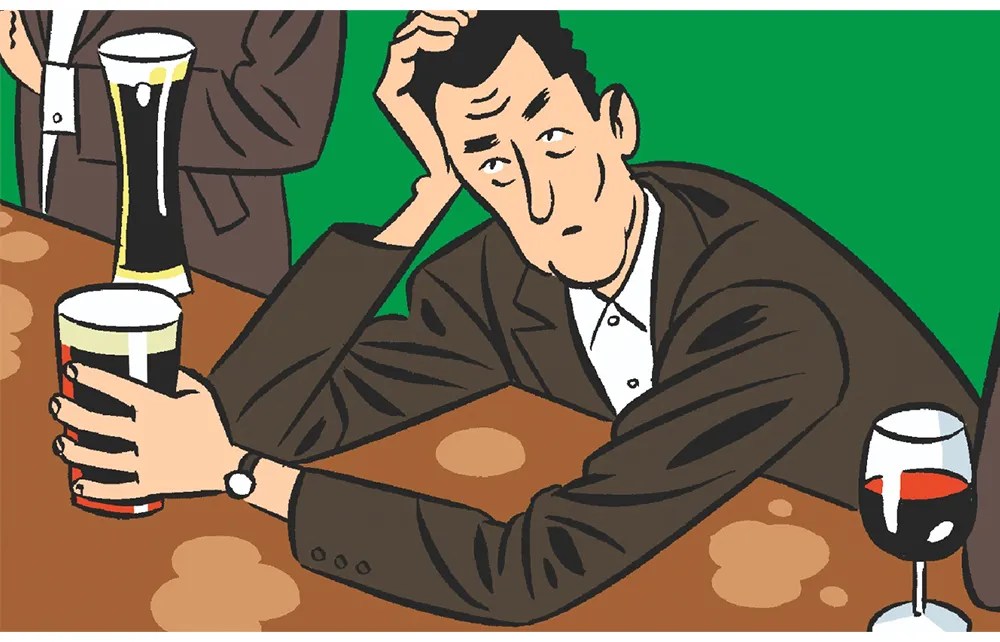I’ve been reading newspapers since I was a teenager and have become strangely familiar with those who write about their lives, even though I’ve met very few of them. Recently, this has gone from being a moderately amusing side interest to an increasingly sad one.
In the late 1990s we lived a few doors down from Times columnist Robert Crampton, in Hackney. We had dinner with the Cramptons a couple of times and found them perfectly affable. And then we moved. So I haven’t seen him in years. But were I to bump into him now, I’m pretty certain he’d be struggling to remember who I was, whereas I’d be more: ‘How are Nicola and the kids? Do you still get to that beach hotel in Pembrokeshire? And how did you get the car out of the ditch during your mishap in the woods in France in 2015?’
These amusing wrong notes for columnists started to get darker
I’ve met some others too, usually at parties: Ulrika Jonsson, Julie Burchill, Giles Coren. But most I don’t know from Adam – except that, in a sense, I do know them. Given the tendency of columnists to show off – which is tempting fate at the best of times – one thing I particularly enjoyed was when things went wrong for them.
One outstanding example of hubris occurred in 1998 with India Knight, then a near neighbour of us and the Cramptons. She had taken over the main column in the Observer from Kathryn Flett, who had previously described how her husband had left her. Things started brightly for Knight with cheerful chat around her marriage, family life and lifestyle – until she suddenly found her life mirroring Flett’s: ‘Stop me if this sounds at all familiar,’ she wrote. ‘But my husband is leaving me.’ This sort of outcome was pure joy for her readers even if miserable for Flett and Knight – though both did get a book out of it.
Then there was Tom Hodgkinson who, after years of writing celebratory features about his smallholding in Devon, suddenly announced he had had enough of the sticks and was moving back to London. Or Liz Jones and Nirpal Dhaliwal, another marriage break up with a spectacular fall out. It happened in 2002 but she was still writing about her wedding day as recently as last month, describing ‘the morose chippy lump my husband morphed into,’ while writing about the actual wedding day.
But then these amusing wrong notes for columnists started to get darker. I recall Simon Mills, who hitherto had written seemingly endless glossy features about his marriage to glamorous model Yasmin, detailing how he became so reduced when she left him that he took to drink and was, at one point, living in his car. Poor old Liz Jones, meanwhile, ceased to be amusing when she described how her post-marriage financial woes had left her on anti-depressants and suffering panic attacks.
This drift towards bleaker outcomes culminated one weekend this April. The cover story in the Saturday Times magazine featured Jeremy Langmead describing his ongoing experience of possibly terminal prostate cancer. I was booked for a scan on my own prostate that afternoon. Although I never really knew Langmead, he was a sometime colleague – he was working for the features section when I was on news at the Evening Standard 20 years ago. But more notoriously he had been the husband who had left India Knight all those years earlier and here he was now, cast in a tragic rather than comic part. It was a hard read, impossible not to feel achingly sorry for him.
An even harder read came in the same day’s Daily Mail. This saw Kathryn Flett – who, like Langmead, I had once laughed at for her marriage woes – describing the death of her son. Jackson, 21, had gone out in Hastings on a Tuesday evening last September and, in a freak accident, fallen onto concrete at the seafront, incurring fatal head injuries. He was the same age as our oldest son; he sounded like him, even looked like him.
I couldn’t recall being so moved by a piece of first-person journalism for a long, long time. Perhaps not since the last few columns in The Spectator by Jeremy Clarke prior to his death last year. Jeremy was so fine a writer that he could make 800 words on an outpatient appointment at a provincial hospital in France contain both gut-wrenching pathos as well as several extraordinarily funny gags. And belatedly I’ve realised the obvious: that Jeremy’s death will be just the first of many. I’m going to have to repeatedly mourn the loss of people I’ve never met. Assuming I don’t go first.
The last collection of Jeremy Clarke’s columns, Spectator Low Life, The Final Years is published on 21 May, the first anniversary of his death. To buy a copy go to spectator.co.uk/shop.







Comments